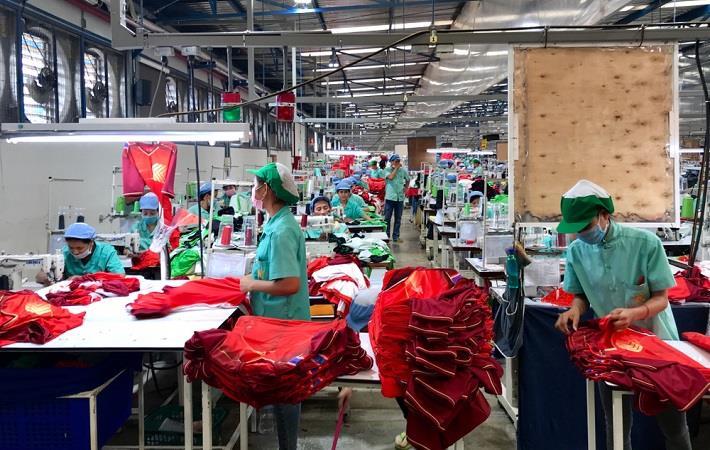Interviews
Cambodia prepares to face upshot of partial EBA withdrawal
14 Aug '20
5 min read

Pic: Shutterstock
As the preferential treatment Cambodia enjoyed under the European Union’s (EU) ‘Everything But Arms’ (EBA) trade arrangement for least developed countries was partially lifted beginning August 12 due to ‘serious and systematic’ concerns related to human rights, the country has been trying in the past few months to gear up to face the expected challenges and has shown indications of a tilt toward China to offset the decision’s impact. Dipesh Satapathy summarises.
Despite extensive lobbying and appeals by various Cambodian trade bodies, including the Cambodian Footwear Association (CFA) and the Garment Manufacturers Association of Cambodia (GMAC), the EU did not change its decision announced in February after a year-long review.
The review was initiated in 2018 after Cambodia's main opposition party was banned and its leader Kem Sokha was charged with treason. GMAC last month asked the International Labour Organisation (ILO) to endorse its appeal, already conveyed in early June to the EU, to postpone EBA withdrawal by a year.
As a last-ditch effort, CFA early this month appealed to the European Commission to take into account the impact of the COVID-19 pandemic and postpone the implementation of the decision. Even the European Chamber of Commerce in Cambodia (EuroCham) and the European Branded Clothing Alliance had earlier appealed to the EU to repeal the decision.
Cambodia’s image across the globe is at stake, apart from the negative impact on its export-driven economy, especially the garment and footwear sectors that are the most affected by the EBA suspension. EU tariffs will now be levied on about a fifth of Cambodia's exports to the bloc, or about $1.1 billion of shipments in dollar terms.
EBA trade preferences on 30 per cent of the value of the country’s 2019 footwear exports to the EU were withdrawn.
Phnom Penh perceives the treatment meted out by the EU as unfair as human rights issues in other countries are being ignored. Prime Minister Hun Sen had earlier said Cambodia would not trade independence for foreign aid.
Earlier this month, the country’s ministry of economy and finance announced it is preparing a five-year (2020-2025) development strategy for the garment, footwear and travel bags sectors to promote their competiveness.
The sectors are now facing some challenges that require more development and competitiveness by the end of 2025, finance minister Aun Pornmoniroth said. “This strategy is an important road map because it will set out a vision to transform Cambodia’s garment, footwear and bag industry into a high-value, supportive, diversified and more competitive industry,” he said.
To achieve this, the strategy will continue to strengthen human resources, increase productivity and create business lines for workers. It will continue to improve working conditions and the welfare of workers, promote direct domestic and international investment in value-added products, attract investment in industries that support the sector and promote export market diversification, its draft said.
In the past few months, Cambodia has introduced a slew of institutional reform measures to facilitate trade and reduce costs for businesses. These include doing away with Camcontrol (the Cambodia Import-Export Inspection and Fraud Repression Directorate-General) checks at all border checkpoints, seaports, special economic zones and other export and import inspection zones within the country and launching online business registration.
A recent CFA survey showed production volumes declined in the first half of 2020 by an average of 20-40 per cent per factory compared to 2019, and sectoral employment reduced by 30,000-40,000 jobs. For the second half of 2020, the forecast is worse. There is not a single member factory that reported an increase in orders compared to the first half of the year, with most factories forecasting a further drop in production for an overall decline of 40-60 per cent for 2020 compared to 2019.
By July end, 70 per cent of member factories had prepared for further reductions in employment or a complete suspension of production, CFA said. Most of the rest had already reduced staff.
Last month, China and Cambodia agreed over the technical aspects and legal framework of a bilateral free trade agreement (FTA). Though it was not disclosed when the FTA will be signed, it is expected to be implemented early next year. Cambodia has listed around 340 more commodities to export to China, bringing the total number of such items to more than 10,000.
During Hun Sen’s visit to China in February to show support for the fight against the coronavirus outbreak, he requested President Xi Jinping to continue to support Chinese investors running businesses in Cambodia even if the country lost its EBA status and open the Chinese market for more Cambodian products. In return, Xi reportedly assured Cambodia that China would continue to support its economy despite a potential EBA suspension.
South Korea and Cambodia too completed a joint feasibility study on a proposed FTA in May and agreed to start domestic procedures to pave the way for official talks. The Cambodian commerce ministry has already enabled the export of some goods to the South Korean market through the World Trade Organisation.
Exports in Cambodia’s garment sector dropped by 5.4 per cent to around $3.78 billion in the first half of this year from more than $4 billion in the same period in 2019, according to the ministry of labour and vocational training, whose spokesman Heng Sour attributed the drop to the impact of the pandemic and a global drop in purchasing. GMAC feels the reason is suspension of factories and fewer purchasing orders.
Cambodia’s economy is expected to contract by as much as 5.5 per cent this year, according to the Asian Development Bank. With the EU suspension having just started, the coming months will show the additional impact that it will have on the country’s economy during the crisis induced by the pandemic.
Despite extensive lobbying and appeals by various Cambodian trade bodies, including the Cambodian Footwear Association (CFA) and the Garment Manufacturers Association of Cambodia (GMAC), the EU did not change its decision announced in February after a year-long review.
The review was initiated in 2018 after Cambodia's main opposition party was banned and its leader Kem Sokha was charged with treason. GMAC last month asked the International Labour Organisation (ILO) to endorse its appeal, already conveyed in early June to the EU, to postpone EBA withdrawal by a year.
As a last-ditch effort, CFA early this month appealed to the European Commission to take into account the impact of the COVID-19 pandemic and postpone the implementation of the decision. Even the European Chamber of Commerce in Cambodia (EuroCham) and the European Branded Clothing Alliance had earlier appealed to the EU to repeal the decision.
Cambodia’s image across the globe is at stake, apart from the negative impact on its export-driven economy, especially the garment and footwear sectors that are the most affected by the EBA suspension. EU tariffs will now be levied on about a fifth of Cambodia's exports to the bloc, or about $1.1 billion of shipments in dollar terms.
EBA trade preferences on 30 per cent of the value of the country’s 2019 footwear exports to the EU were withdrawn.
Phnom Penh perceives the treatment meted out by the EU as unfair as human rights issues in other countries are being ignored. Prime Minister Hun Sen had earlier said Cambodia would not trade independence for foreign aid.
Earlier this month, the country’s ministry of economy and finance announced it is preparing a five-year (2020-2025) development strategy for the garment, footwear and travel bags sectors to promote their competiveness.
The sectors are now facing some challenges that require more development and competitiveness by the end of 2025, finance minister Aun Pornmoniroth said. “This strategy is an important road map because it will set out a vision to transform Cambodia’s garment, footwear and bag industry into a high-value, supportive, diversified and more competitive industry,” he said.
To achieve this, the strategy will continue to strengthen human resources, increase productivity and create business lines for workers. It will continue to improve working conditions and the welfare of workers, promote direct domestic and international investment in value-added products, attract investment in industries that support the sector and promote export market diversification, its draft said.
In the past few months, Cambodia has introduced a slew of institutional reform measures to facilitate trade and reduce costs for businesses. These include doing away with Camcontrol (the Cambodia Import-Export Inspection and Fraud Repression Directorate-General) checks at all border checkpoints, seaports, special economic zones and other export and import inspection zones within the country and launching online business registration.
A recent CFA survey showed production volumes declined in the first half of 2020 by an average of 20-40 per cent per factory compared to 2019, and sectoral employment reduced by 30,000-40,000 jobs. For the second half of 2020, the forecast is worse. There is not a single member factory that reported an increase in orders compared to the first half of the year, with most factories forecasting a further drop in production for an overall decline of 40-60 per cent for 2020 compared to 2019.
By July end, 70 per cent of member factories had prepared for further reductions in employment or a complete suspension of production, CFA said. Most of the rest had already reduced staff.
Last month, China and Cambodia agreed over the technical aspects and legal framework of a bilateral free trade agreement (FTA). Though it was not disclosed when the FTA will be signed, it is expected to be implemented early next year. Cambodia has listed around 340 more commodities to export to China, bringing the total number of such items to more than 10,000.
During Hun Sen’s visit to China in February to show support for the fight against the coronavirus outbreak, he requested President Xi Jinping to continue to support Chinese investors running businesses in Cambodia even if the country lost its EBA status and open the Chinese market for more Cambodian products. In return, Xi reportedly assured Cambodia that China would continue to support its economy despite a potential EBA suspension.
South Korea and Cambodia too completed a joint feasibility study on a proposed FTA in May and agreed to start domestic procedures to pave the way for official talks. The Cambodian commerce ministry has already enabled the export of some goods to the South Korean market through the World Trade Organisation.
Exports in Cambodia’s garment sector dropped by 5.4 per cent to around $3.78 billion in the first half of this year from more than $4 billion in the same period in 2019, according to the ministry of labour and vocational training, whose spokesman Heng Sour attributed the drop to the impact of the pandemic and a global drop in purchasing. GMAC feels the reason is suspension of factories and fewer purchasing orders.
Cambodia’s economy is expected to contract by as much as 5.5 per cent this year, according to the Asian Development Bank. With the EU suspension having just started, the coming months will show the additional impact that it will have on the country’s economy during the crisis induced by the pandemic.
Fibre2Fashion News Desk (DS)
Popular News
Leave your Comments
Kimberly Morgan and Rik Veltman
K3 Business Technology Group PLC
Therese Premler-Andersson
Textile Machinery Association of Sweden (TMAS)
































-Ltd..jpg?tr=w-120,h-60,c-at_max,cm-pad_resize,bg-ffffff)





.jpg?tr=w-120,h-60,c-at_max,cm-pad_resize,bg-ffffff)
.jpg?tr=w-120,h-60,c-at_max,cm-pad_resize,bg-ffffff)






